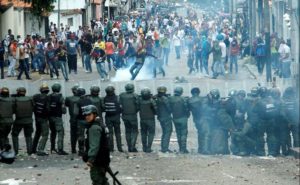Millions of victims of human rights abuse in Venezuela
 The number of refugees and migrants who have fled human rights abuse, violence and political and economic turmoil in Venezuela has reached 3.4 million, according to the UNHCR and IOM, the International Organization for Migration.
The number of refugees and migrants who have fled human rights abuse, violence and political and economic turmoil in Venezuela has reached 3.4 million, according to the UNHCR and IOM, the International Organization for Migration.
Data from national immigration authorities and other sources shows countries in Latin America and the Caribbean are hosting an estimated 2.7 million Venezuelans, while other regions across the globe are host to the rest.
On average, during 2018, an estimated 5,000 people left Venezuela every day in search of protection or a better life.
Colombia hosts the highest number of refugees and migrants from Venezuela, with over 1.1 million. It is followed by Peru, with 506,000; Chile, 288,000; Ecuador, 221,000; Argentina, 130,000; and Brazil, 96,000. Mexico and countries in Central America and the Caribbean are also hosting significant numbers of refugees and migrants from Venezuela.
The exodus is largely the result of the authoritarian rule of Nicolas Maduro. Since 2013, he has gradually consolidated enough power to become the country’s de facto dictator. He is currently not recognized as the legitimate president of Venezuela by more than 50 countries and a number of international organisations.
Maduro has been criticized for only concentrating on public opinion instead of tending to the practical issues economists have warned the Venezuelan government about or creating any strategies to improve the economic situation in Venezuela.
He has relied on the military to maintain power since he was initially elected into office and, in May last year, a Board of Independent Experts designated by the Organisation of American States published a 400 page report accusing Maduro of leading crimes against humanity and using authoritarianism to maintain a hold on power in Venezuela.
The Board concluded that Maduro was “responsible for dozens of murders, thousands of extra-judicial executions, more than 12,000 cases of arbitrary detention, more than 290 cases of torture, attacks against the judiciary and a ‘state-sanctioned humanitarian crisis’ affecting hundreds of thousands of people.
The UNHCR says that countries accepting Venezuelans have shown tremendous solidarity with the refugees and migrants and implemented resourceful solutions to help them.
But the new figures point to the strain on host communities and the continued need for support from the international community, at a time when the world’s attention is on political developments inside Venezuela.
Latin American countries have granted some 1.3 million residence permits and other forms of regular status to Venezuelans and reinforced their asylum systems in order to process an unprecedented number of asylum applications, the UNHCR says.
Since 2014, over 390,000 asylum claims have been lodged by Venezuelans, over 232,000 in 2018 alone.
“With rising numbers, the needs of refugees and migrants from Venezuela and the communities hosting them continue to increase,” a UNHCR briefing paper says.
“Governments in the region have strengthened their national response and are cooperating – through the Quito process – to enhance the assistance and protection of Venezuelan nationals and facilitate their legal, social and economic inclusion. The next regional meeting of this process will take place in Quito in the first week of April,” it says.
“To complement these efforts, a humanitarian Regional Refugee and Migrant Response Plan (RMRP) for refugees and migrants from Venezuela was launched last December, targeting 2.2 million Venezuelans and 500,000 people in host communities in 16 countries,” the paper says.
Laurie Nowell
AMES Australia Senior Journalist












